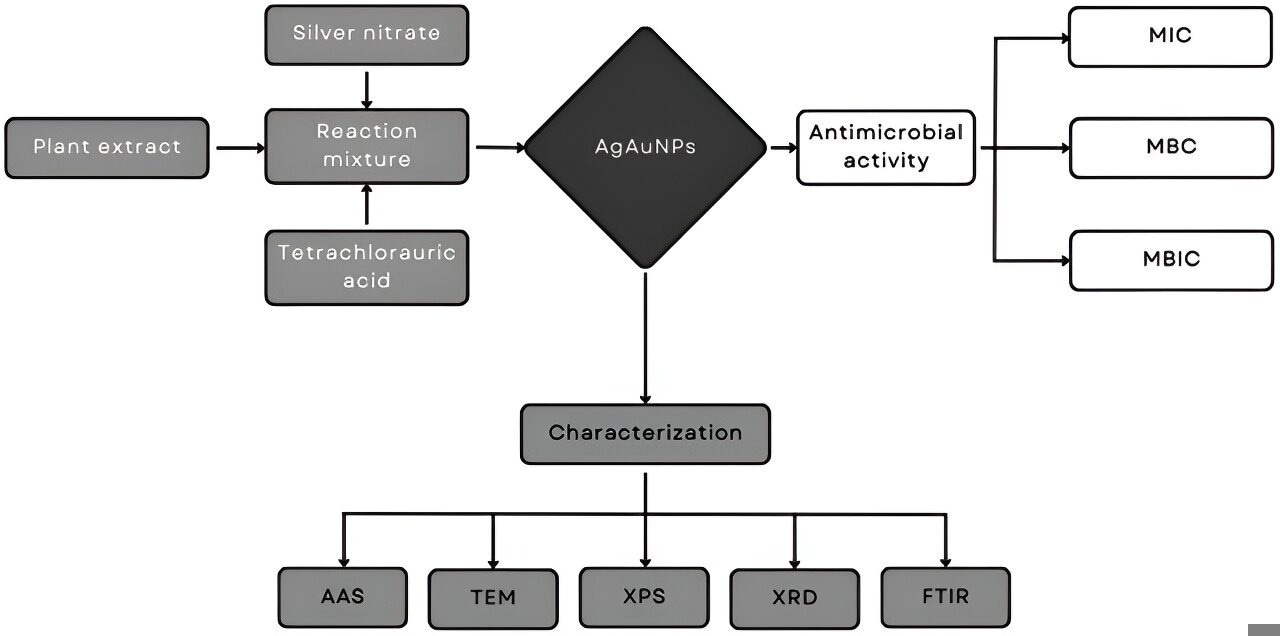According to a study published in RSC Advances, researchers at the University of Chemistry and Technology in Prague efficiently synthesized bimetallic nanoparticles from waste extracts of Cannabis sativa and Vitis vinifera, demonstrating an environmentally friendly approach with antimicrobial properties.
 Flowchart summarizing the contents of the study, showing the bimetallic nanoparticle synthesis method and the subsequent physico-chemical characterization as well as antimicrobial activity experiments. Image Credit: University of Chemistry and Technology Prague
Flowchart summarizing the contents of the study, showing the bimetallic nanoparticle synthesis method and the subsequent physico-chemical characterization as well as antimicrobial activity experiments. Image Credit: University of Chemistry and Technology Prague
In pursuit of long-term solutions, this study focused on the green synthesis of nanoparticles, stressing the value of plant waste.
Our study aims to contribute to a circular economy by transforming agricultural waste into valuable materials.
Jana Michailidu, Study Corresponding Author and Academic Staff Member, University of Chemistry and Technology in Prague
She added, “The use of Cannabis sativa and Vitis vinifera waste not only addresses waste management challenges but also provides an effective method to combat microbial infections.”
The research focused on extracting bioactive compounds from plant scrap materials, which were subsequently combined with silver nitrate and tetrachloroauric acid to synthesize bimetallic nanoparticles (AgAuNPs).
The nanoparticles were analyzed using a range of advanced techniques, including UV-Vis spectrophotometry, transmission electron microscopy, and X-ray diffraction. The study found that these nanoparticles demonstrated notable antimicrobial properties against several strains of Pseudomonas aeruginosa, a well-known Gram-negative bacterium.
“The antimicrobial properties of the biosynthesized AgAuNPs are particularly promising. They not only inhibit the growth of Pseudomonas aeruginosa but also prevent biofilm formation, which is crucial in the fight against antibiotic-resistant infections,” Michailidu added.
The study highlights the dual advantages of this method: it not only addresses waste management effectively but also yields valuable antimicrobial agents.
Michailidu concluded, “This research supports the development of eco-friendly and cost-effective approaches for nanoparticle production, addressing both environmental and public health challenges.”
The successful synthesis and characterization of these nanoparticles represent a significant advancement in sustainable nanotechnology. The University of Chemistry and Technology in Prague remains at the forefront of pioneering research that supports global sustainability objectives.
Journal Reference:
Michailidu, J., et. al. (2024) Bimetallic nanoparticle production using Cannabis sativa and Vitis vinifera waste extracts. RSC Advances. doi 10.1039/D3RA07134K